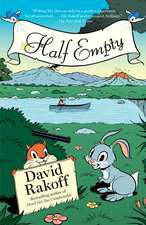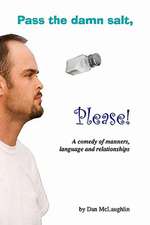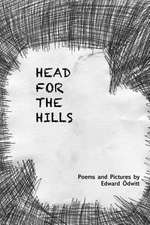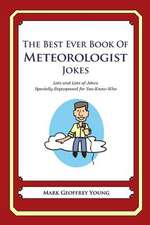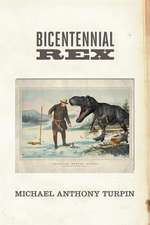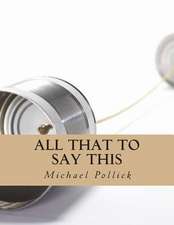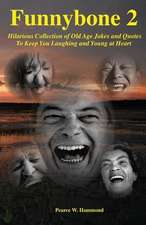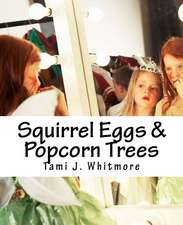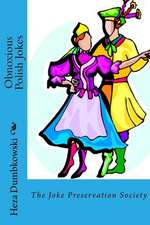Fraud: Essays
Autor David Rakoffen Limba Engleză Paperback – 31 mar 2002
Vezi toate premiile Carte premiată
Lambda Literary Awards (2001)
Preț: 104.59 lei
Nou
Puncte Express: 157
Preț estimativ în valută:
20.01€ • 20.90$ • 16.56£
20.01€ • 20.90$ • 16.56£
Carte disponibilă
Livrare economică 15-29 martie
Preluare comenzi: 021 569.72.76
Specificații
ISBN-13: 9780767906319
ISBN-10: 0767906314
Pagini: 240
Dimensiuni: 133 x 204 x 14 mm
Greutate: 0.19 kg
Editura: Anchor Books
ISBN-10: 0767906314
Pagini: 240
Dimensiuni: 133 x 204 x 14 mm
Greutate: 0.19 kg
Editura: Anchor Books
Notă biografică
DAVID RAKOFF is a regular contributor to Salon, Outside magazine, and Public Radio International’s This American Life, and has written for the New York Times Magazine, GQ, Esquire, Harper’s Bazaar, the New York Observer, and many other publications. He lives in New York City.
Extras
Erla Steffansdottir makes her miving as a piano teacher, but is more widely known as one of Iceland's most noted Elf communicators. Her maps of Hidden People sites are on sale in tourist shops all around Iceland.She claims she has been seeing elves and Hidden People her whole life. I have been led to believe that my chances of meeting Erla would be slim to none, that she is difficult, that she will not be helpful, that she traffics in arbitrary rivalries in the Elf-spotting community.
I'm inclined to believe the rumors after my initial encounter when I first call to set up the interview. Erla actually seems to be sobbing on the other end of the phone, all the while talking to me. Then again, in her defense, who actually picks up the phone in the middle of a crying jag? Besides, without having to push, she tells me to come the next day at four o'clock.
I was expecting a wild hair, clanking jewelry, a tatterdemalion velvet cape from whose folds wafted the scent of incense, a house full of candles, dream catchers, cats, and bad art. Instead, I found a friendly if somewhat shy woman in her forties living in a lovely apartment on the top floor of a Reykjavik townhouse with a bay window. Aside from a tiny elf figure made of three painted stones, piled up snowman style outside her front door, Erla's house is decorated in the tasteful, middle class aesthetic one might expect of a piano teacher: landscape paintings, old furniture. The place is warm and cozy on a particularly blustering, windy day.
Erla's friend Bjork is there to translate, although Erla's English is sufficient to slap me down at our rather awkward beginning. I ask when she first realized she could see Hidden People. "This is very stupid to ask when I see. When I was born. Like that one right there." she says, indicating a place on the coffee table beside a Danish modern glass ashtray. She then catches herself. "Oh that's right. You can't see it." she shakes her head slightly, amused at her forgetfulness that others do not possess her gift. It's a somewhat disingenuous moment, like when your friend, newly back from a semester in Paris, says to you, "It's like, uhm, oh I forget the English word, how you say....fromage?"
Apparently the coffee table in front of me is a veritable marketplace of elves milling about, many of them in separate dimensions and oblivious to one another. Bjork takes over, essentially ferrying me through this gnomish cocktail party:
"One sits there, two are walking over here, one sits there. When she plays music they come. It attracts them."
I am suddenly overcome with a completely inappropriate urge: the barely suppressed impulse to slam my hand down on the coffee table really, really hard, right where she's pointing.
Apparently the elves on the table are in too remote a dimension, and are too small to talk to. Conveniently, every home also comes equipped with a House Elf, about the size of the average three-year-old, with whom one can communicate. "Every home?" I ask.
"Yes you have one in your house in New York, too." Bjork assures me.
If only my House Elf, sick and tired of my skepticism, was taking pains to prove his existence once and for all by cleaning my apartment for me at that very moment, I joke. Leadest of balloons.
But Bjork points out that house elves are a privilege, not a right. When the energy of a given house gets too negative, she says, when there is drinking or fighting, the elves will leave. Not terribly surprisingly, mysticism, New Age philosophy, Recovery-speak, and elves are conflated as one. Erla says that elves are a manifestation of nature, they are inherently good; without them we would choke on our own pollution. There is almost no more urban point of view of nature than this pastoral, idyllic one: Humankind bad, Nature good. As in, drinking and fighting bad, elves and flowers good. But it's a false dichotomy. After all, following this logic, Sistine Chapel bad, Ebola virus good?
I'm inclined to believe the rumors after my initial encounter when I first call to set up the interview. Erla actually seems to be sobbing on the other end of the phone, all the while talking to me. Then again, in her defense, who actually picks up the phone in the middle of a crying jag? Besides, without having to push, she tells me to come the next day at four o'clock.
I was expecting a wild hair, clanking jewelry, a tatterdemalion velvet cape from whose folds wafted the scent of incense, a house full of candles, dream catchers, cats, and bad art. Instead, I found a friendly if somewhat shy woman in her forties living in a lovely apartment on the top floor of a Reykjavik townhouse with a bay window. Aside from a tiny elf figure made of three painted stones, piled up snowman style outside her front door, Erla's house is decorated in the tasteful, middle class aesthetic one might expect of a piano teacher: landscape paintings, old furniture. The place is warm and cozy on a particularly blustering, windy day.
Erla's friend Bjork is there to translate, although Erla's English is sufficient to slap me down at our rather awkward beginning. I ask when she first realized she could see Hidden People. "This is very stupid to ask when I see. When I was born. Like that one right there." she says, indicating a place on the coffee table beside a Danish modern glass ashtray. She then catches herself. "Oh that's right. You can't see it." she shakes her head slightly, amused at her forgetfulness that others do not possess her gift. It's a somewhat disingenuous moment, like when your friend, newly back from a semester in Paris, says to you, "It's like, uhm, oh I forget the English word, how you say....fromage?"
Apparently the coffee table in front of me is a veritable marketplace of elves milling about, many of them in separate dimensions and oblivious to one another. Bjork takes over, essentially ferrying me through this gnomish cocktail party:
"One sits there, two are walking over here, one sits there. When she plays music they come. It attracts them."
I am suddenly overcome with a completely inappropriate urge: the barely suppressed impulse to slam my hand down on the coffee table really, really hard, right where she's pointing.
Apparently the elves on the table are in too remote a dimension, and are too small to talk to. Conveniently, every home also comes equipped with a House Elf, about the size of the average three-year-old, with whom one can communicate. "Every home?" I ask.
"Yes you have one in your house in New York, too." Bjork assures me.
If only my House Elf, sick and tired of my skepticism, was taking pains to prove his existence once and for all by cleaning my apartment for me at that very moment, I joke. Leadest of balloons.
But Bjork points out that house elves are a privilege, not a right. When the energy of a given house gets too negative, she says, when there is drinking or fighting, the elves will leave. Not terribly surprisingly, mysticism, New Age philosophy, Recovery-speak, and elves are conflated as one. Erla says that elves are a manifestation of nature, they are inherently good; without them we would choke on our own pollution. There is almost no more urban point of view of nature than this pastoral, idyllic one: Humankind bad, Nature good. As in, drinking and fighting bad, elves and flowers good. But it's a false dichotomy. After all, following this logic, Sistine Chapel bad, Ebola virus good?
Recenzii
"Combining journalistic tenacity, literary smarts, and a talent for gut-busting one-liners, Rakoff reports on his wilted salad days . . . His blend of withering wit and self-effacing humor makes these essays soar." –Entertainment Weekly
"Rakoff possesses a sociologist's eye for places where today’s consoling myths reside."
–New York Times
"David Rakoff’s Fraud showcases his rapier wit, slashing in all directions with slice-of-life insights and cutting remarks, sometimes nicking himself with self-deprecation in his dexterous duello with the American experience." –Publishers Weekly (starred review)
"Rakoff likes to paint himself as urbane to a fault, an outsider anywhere unpaved. But then, in the woods or on a mountaintop, he reveals himself, despite his searing and hilarious observations, to be a completely unrelenting romantic."
–Dave Eggers, author of A Heartbreaking Work of Staggering Genius
"David Rakoff's hilarious, bittersweet stories are epic struggles–between smoky bars and the great outdoors, management and labor, Santa Claus and Sigmund Freud, New York versus everywhere else, and, not least, neighbor-to-the-North against South. Rakoff is such an American original it turns out he’s Canadian. Vive the brain drain!"
-Sarah Vowell, author of Take the Cannoli
"Rakoff possesses a sociologist's eye for places where today’s consoling myths reside."
–New York Times
"David Rakoff’s Fraud showcases his rapier wit, slashing in all directions with slice-of-life insights and cutting remarks, sometimes nicking himself with self-deprecation in his dexterous duello with the American experience." –Publishers Weekly (starred review)
"Rakoff likes to paint himself as urbane to a fault, an outsider anywhere unpaved. But then, in the woods or on a mountaintop, he reveals himself, despite his searing and hilarious observations, to be a completely unrelenting romantic."
–Dave Eggers, author of A Heartbreaking Work of Staggering Genius
"David Rakoff's hilarious, bittersweet stories are epic struggles–between smoky bars and the great outdoors, management and labor, Santa Claus and Sigmund Freud, New York versus everywhere else, and, not least, neighbor-to-the-North against South. Rakoff is such an American original it turns out he’s Canadian. Vive the brain drain!"
-Sarah Vowell, author of Take the Cannoli
Descriere
Journalist, actor, and radio commentator Rakoff has gathered in his first book what can best be described as essays on contemporary culture. And therein lies Rakoff's genius and his burgeoning appeal. The wry and the heartfelt join in his prose to resurrect that most neglected of literary virtues: wit.
Premii
- Lambda Literary Awards Winner, 2001



